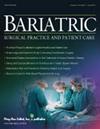Association Between Vitamin D Levels and Nonalcoholic Fatty Liver Disease in Bariatric Surgery Candidates
IF 0.3
4区 医学
Q4 NURSING
引用次数: 0
Abstract
Introduction: Vitamin D acts on a series of regulatory and signaling processes in the liver parenchyma, which are closely related to energy metabolism and inflammatory responses. This immune-inflammatory role is particularly interesting for understanding the correlation between serum vitamin D levels, obesity, and nonalcoholic fatty liver disease (NAFLD). Methods: This retrospective observational study collected secondary data from medical records of patients who underwent bariatric surgery with vertical gastrectomy from 2014 to 2018. After applying the inclusion and exclusion criteria, 164 patients were selected, with preoperative analysis of anthropometric, clinical, biochemical, and imaging parameters. Results: The group without steatosis showed higher serum vitamin D levels (in median) when compared to the groups with mild and moderate/severe steatosis, respectively. When vitamin D status and variables related to social drinking, body mass index degree, and lipid profile were evaluated, only alcohol consumption was associated with vitamin D insufficiency (p = 0.042). Conclusions: There is a high prevalence of vitamin D insufficiency/deficiency in the bariatric surgery preoperative period. Furthermore, it was not possible to establish a causal relationship between vitamin D deficiency and NAFLD, notwithstanding the verification of higher serum vitamin D levels in individuals who did not have liver lesions on ultrasonography.减肥手术患者维生素D水平与非酒精性脂肪肝的关系
维生素D作用于肝实质的一系列调控和信号传导过程,与能量代谢和炎症反应密切相关。这种免疫炎症作用对于理解血清维生素D水平、肥胖和非酒精性脂肪性肝病(NAFLD)之间的关系尤其有趣。方法:本回顾性观察性研究收集了2014年至2018年接受减肥手术合并垂直胃切除术患者病历的二次资料。应用纳入和排除标准,选择164例患者,术前进行人体测量、临床、生化和影像学参数分析。结果:无脂肪变性组的血清维生素D水平(中位数)分别高于轻度和中度/重度脂肪变性组。当评估维生素D状态和与社交饮酒、体重指数程度和血脂相关的变量时,只有饮酒与维生素D不足有关(p = 0.042)。结论:在减肥手术术前,维生素D不足/缺乏的发生率较高。此外,不可能建立维生素D缺乏和NAFLD之间的因果关系,尽管在超声检查没有肝脏病变的个体中证实了较高的血清维生素D水平。
本文章由计算机程序翻译,如有差异,请以英文原文为准。
求助全文
约1分钟内获得全文
求助全文
来源期刊
CiteScore
0.80
自引率
0.00%
发文量
36
期刊介绍:
Bariatric Surgical Practice and Patient Care is the essential peer-reviewed journal delivering clinical best practices and quality updates for achieving optimal bariatric surgical outcomes.
Bariatric Surgical Practice and Patient Care coverage includes:
Quality outcomes measurement and reporting
Process innovations and care delivery
Short- and long-term surgical complications
Pre-surgical diagnosis and consultation
Pre-op, peri-op, and post-op standards of practice
Patient access
Patient safety issues
Nutritional and dietary support
Bariatric surgical emergencies
Best practices and current standards for bariatric surgery
Culture and ethics
Body contouring and reconstructive surgery
Bariatric teamwork and communication.

 求助内容:
求助内容: 应助结果提醒方式:
应助结果提醒方式:


